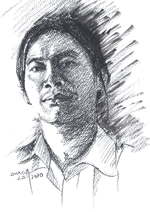
| By AUNG ZAW | Tuesday, November 22, 2011 |
US Secretary of State Hillary Clinton will visit Burma soon.
The release of political prisoners, the end of hostilities toward ethnic minorities and the deepening of the country's democratization process should all be high on her agenda.
Some observers have expressed doubts about what she can hope to achieve during a two-day visit. But the trip will be significant nonetheless, in that it will be the first to Burma by a US secretary of state in more than 50 years. She will meet the president, opposition leaders and other stakeholders. Aung San Suu Kyi, who spoke with President Obama last week, said that she welcomed Clinton's visit.
One thing I am sure of is that Clinton won't be shy about raising the issue of human rights abuses in Burma. I hope that the leaders of the country's quasi-civilian government are mentally prepared to address this issue directly when they come face to face with the secretary of state.
 |
| Aung Zaw is founder and editor of the Irrawaddy magazine. He can be reached at [email protected]. |
Burma's new rulers say they want to repair the country's relationship with the US and normalize diplomatic ties between the two countries. But that won’t happen anytime soon.
Following Obama's announcement that he was sending his top diplomat to Burma, Clinton made it clear that the visit didn't mean the US was about to lift sanctions. “We’re not ending sanctions. We are not making any abrupt changes. We have to do some more fact finding, and that’s part of my trip,” she said in an interview with Fox News.
Since 1988, many political prisoners have been released in occasional amnesties, only to be locked up again when the political climate shifted. It's worth remembering, amid all the excitement over the recent release of around 200 political prisoners, that when the now-retired Sen-Gen Than Shwe became chairman of the ruling junta in 1992, he issued an order releasing thousands of political prisoners. In 2004 and 2005, after the feared intelligence chief Gen Khin Nyunt and his intelligence unit were purged, the regime again freed several thousand prisoners, including 88 Generation student leaders Min Ko Naing and Ko Ko Gyi.
This time, the new “reform-minded” president has refused to even acknowledge the existence of political prisoners. But while the figures may vary, all impartial observers know that there are many still behind bars.
Last week, two of the most prominent—Min Ko Naing and Shan leader Hkun Tun Oo—were relocated. Observers suspect that before and during Clinton’s visit, the government will make a token gesture, releasing some more political prisoners while keeping many others behind bars. Will Min Ko Naing (who is considered more a “political poet” than a politician) be freed and Ko Ko Gyi (who is regarded as a serious political strategist) remain in prison?
This is not the only issue that stands in the way of a return to normal relations between Washington and Naypyidaw. Another major concern is ongoing offensives and human rights violations in ethnic regions, in spite of the “progress” and “significant steps” that foreign leaders have lauded in recent months.
In a recent press release, US Senator John Kerry, a former presidential hopeful who has visited Burma several times and taken a strong interest in the country, reiterated that “actions still speak louder than words. The government needs to unconditionally release all prisoners of conscience and put a stop to the atrocities that reportedly continue unabated along the border.”
When Clinton meets Burma's leaders next month, they should expect to hear all this and more. The US has strategic and national interests in Burma, so besides the issues of democracy and human rights, Clinton will want to talk about drugs, Burma’s shady relations with North Korea and the nonproliferation issue, and China's growing influence.
Obama's description of the current situation in Burma was right on the mark. “We've seen flickers of progress in these last several weeks,” he said when announcing Clinton's visit last Friday.
Progress is progress, and should be welcomed, but a flicker of progress is not enough to suggest that the country is on the road to major and sustained political reforms. Not yet.
I have no doubt that Clinton will get the pop-star treatment in Burma, even if the country's leaders are not too keen on hearing what she will have to say. But whether the government is ready for it or not, she should go to send a strong, clear message that more substantial reforms must be forthcoming, and to meet the courageous people of Burma, whose hopes for the future are now higher than they have been at any time in recent decades.
Related article: The US-Burma Connection